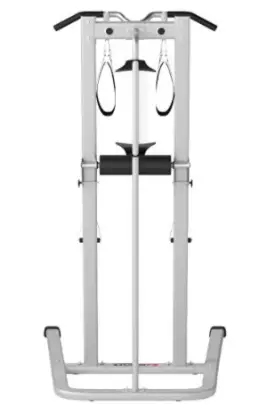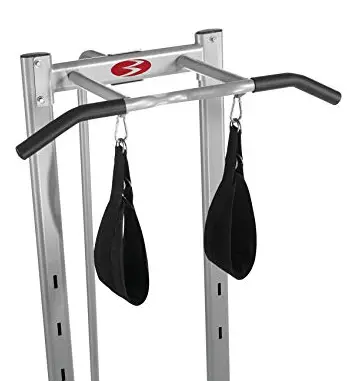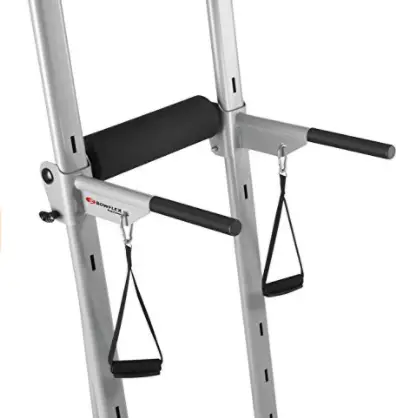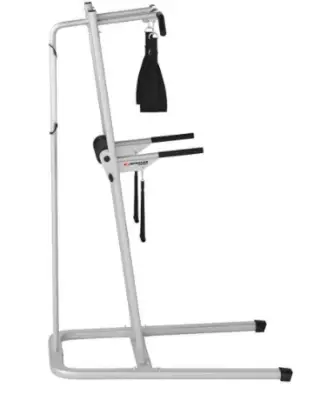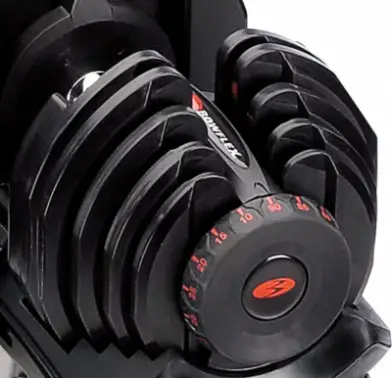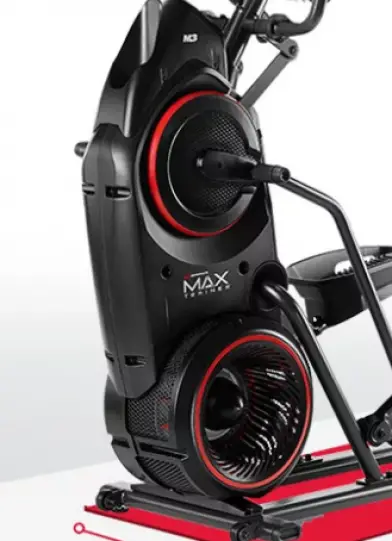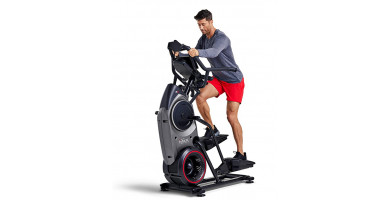Bowflex Body Tower Reviewed and Rated
Bowflex will forever be associated with its power rod system and multigym units, plugged and promoted in late-night infomercials complete with before and after stories and captions like “Tony lost 37 pounds in just 20 minutes a day, 3 times a week.”
The thing is, though, Bowflex machines do actually work. Any of the multigyms will give you an adequate resistance workout, building strength and also increasing heart health. And their newest units will do it without taking up extra space. Nowadays, Bowflex is more like a regular fitness company, with bikes, hybrid trainers, and more common gym equipment for home users. All Bowflex products encourage the DIY fitness buff and provide a whole gym worth of exercises in a single adjustable unit.
This also means Bowflex now offers handheld equipment, like the Selecttech dumbbells, which use weighted discs and a dial system to adjust resistance. Then there are tools like today’s review, the Bowflex Body Tower. The Tower is a solid steel frame that lets you do pull-ups, dips, leg raises, and a surprising number of other upper body exercises without ever holding a plank or crossing your arms for sit-ups.
Offers about 20 exercises, and transitioning between them is fast and easy
Assembly is easy and will not take a long time
Construction is stable and durable--unit will last a long time
Slings and handles, included in the package, are comfortable and open up new possibilities
Uses bodyweight as resistance, so no plates or barbells to keep up with
Powder-coated steel tubing with sleek white finish; stable base keeps you secure
Product weight is low (120 pounds) with a max user weight of 300
The tower is rather short and will not be suitable for taller than average users
The footprint is large and tower will take up as much space as some machines or multi-gyms
The Rundown
One disadvantage we found, and one of the only negative reviews on the Bowflex product page, is that the rubberized feet are fixed and there is no way to adjust them. This means that, if your gym space is not perfectly level, you will have to rig up a shim. Bowflex is normally so good at thinking of everything, so we're not sure why they didn't make the legs independently adjustable or just add something to the feet themselves.
The weight capacity is 300 pounds. Unlike with a bench, that is the total weight and not combined user/resistance weight. We mentioned taller users having trouble or needing to fold their legs, but the weight limit won't exclude as many people and the reviews we read show that the steel frame and foundation feel sturdy even during strenuous training.
According to the owner's manual, you need 36 inches of clearance, minimum, on the sides of the tower. That includes the front, and the goal is for you to have enough space to mount and dismount effectively. It is hard to imagine an emergency situation on the Body Tower, but Bowflex wants you able to get off quickly just in case. The tower will not tip over as long as you use it according to directions; if you stay under the weight limit, you can strap a weight plate to yourself or wear a harness to add resistance above your body weight.
Features
The Body Tower measures 50 inches wide and 51 inches long at its deepest point, the square steel tubing foundation. The tower is 76.9 inches high, about 6 and a half feet. It is a concession to residential ceilings, which are often 8 feet, and the short length will ensure headroom and safety. But it also causes problems for those of us with long legs or a slender frame. The width is enough to accommodate most anyone with a large curvy frame, though.
At the top of the tower, on the ends of the pull-up bar, you can install the sling straps. You may have used these before. They are thick nylon strips, with padding, that gets narrow on the fabric ends. The ends attach to the bar with snap hooks. Once in place, you can hang on the straps instead of the bar. That challenges your balance and helps bring in overlooked muscle groups in your arms, back, and trunk. Some sling straps use carabiners instead of snap hooks. Carabiners will be stronger and part of a more heavy-duty rig. As long as you are following Bowflex weight limits, the sling straps will be safe and the fabric will not rip or tear. You always have the option to remove the sling straps if they are in your way or you want to do unenhanced pull-ups.
The other assist straps hang from the parallel bars at the center of the tower. Bowflex calls them handgrips. They are similar to the handles you might use on a lat pulldown machine. These grips enable you to get low to the ground and do reverse pushups or dips. Since the grips are a few feet off the ground, too, you get a full range of motion on the dips. You can also do low down dips by holding onto the center handles, without the extra challenge of the straps and with more stability.
If you want the fullest range of motion, with dips, you can climb onto the tower from a standing position and pull your entire body up and down with those center handles. Bowflex calls them "EZ Adjust Bars." Like the J-Cups on squat rack uprights, you can move the center handles to get a lower or higher start position. The top handles are fixed but do offer several widths of padded handle grips. The foam used for padding is comfortable and durable. The back pad is also thickly padded, looking and feeling like the roller on a leg extension machine.
But What Can You Do With It/Stick With It Factor
Single leg squats--rest one foot on the back pad, go down with the other one as far as your joints will allow. You could also hack a Bulgarian split squat this way. The back pad makes single-leg squats available to people (like your editors) who do not have the flexibility yet for pistol squats. And we like that Bowflex wants you to use the back pad for more than just your back.
Supine row--you can lie on your back, with bent legs and feet resting on the back of the Body Tower frame. Bend your back while keeping your glutes on the floor, and use the handgrips to pull yourself up off the floor. It is as effective for your back as rowing with plates and barbells, and you can dial in the handgrip position according to your flexibility and goals.
Incline push up--again, the center handles make this exercise convenient by letting you raise and lower them with the pins and upright holes. Incline push-ups are like regular push-ups, but they force muscles in your hips, legs, and back to engage and act as stabilizers. This adds extra benefits you will not get by doing push-ups on the floor.
Now, about that stick with the "it" factor. Will the Bowflex Body Tower become your new best friend, something you spend time with either as your primary strength trainer or to fill the gaps between sport-specific workouts? Yes. We are sure it will. It is convenient, easy to use, comfortable, and durable thanks to Bowflex engineering. If you do have problems, Bowflex provides several ways for you to reach an outstanding customer service department.

